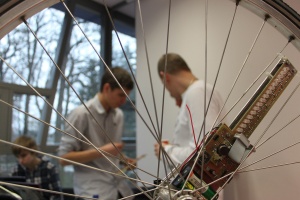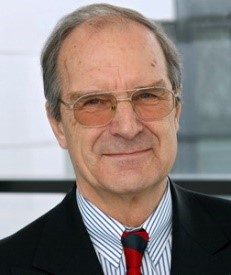The Systems Engineering course invites to a guest Lecture on Model based Systems Engineering (MBSE) as an indispensable Asset for a Digital Enterprise Strategy with Prof. Dipl.-Ing. Heinz Stoewer.
When: October 17, 2014
Where: Hypercube, Skokovo Innovation Center
What:
Model-based Systems Engineering (MBSE) is the most important advent for System Engineering in past decades. It represents an important avenue for the future of the profession.
While it appears new and innovative it is in fact the consequence of progress made in computing, simulation, virtualization and modelling. It largely parallels developments in other engineering disciplines and beyond.
Looking at advances in the digital technologies and IT business one can observe new capabilities to deal with complexity and data management across most industries.
This lecture will introduce the basics of MBSE and sketch its applicability and status. It will highlight some of the trends towards what some call the 4th digital revolution and show that MBSE is part of this trend. It will outline a path forward and identify some of the objectives to be pursued to mature this new SE capability.
For more info and registration please contact:
Speaker introduction
Prof. Dipl.-Ing. Heinz Stoewer:
- Advanced degrees in Technical Physics, Economics and Systems Management from German and US Universities
- 1962 Boelkow KG, Munich, today Airbus Defence and Space, space project engineer/group leader
- 1967 MDAC, USA, today Boeing, various systems and project management positions on “post Apollo” and advanced space transportation projects
- 1973 European Space Agency, ESA, Technical Centre ESTEC, first Programme Manager Spacelab, building Europe’s foundations in “manned space”;
1978 Founder of ESA’s Systems Engineering and Programmatics Department with System Studies, System Integration, Programmatics and Technology R&D Divisions
- 1986 Delft University of Technology, first Professor/Chair for Space Systems Engineering; Founding Director international postgraduate “SpaceTech” Master programme (part-time)
- 1990 Managing Director national and international programmes German Space Agency (DARA GmbH); member/chair of various technical and policy boards, e.g. ESA Council and EO/MET Programme Board, CEAS, European Union Space Advisory Group, et al
- 1995 Founder/President Space Associates GmbH, an international network based company with focus upon space, systems engineering, project management and education
- Current functions and positions include:
- Member Governing Boards of OHB AG, Germany, and Space Research Organization Netherlands (SRON)
- Member Advisory Board Dutch National Space Agency (NSO)
- Advisor Systems Engineering Airbus Corporate Technical Office (CTO)
- Chair Airbus Defence and Space Academy internal Project Reviews and Training Boards, France and Germany
- Distinguished Visiting Scientist NASA JPL, USA
- Fellow and Past President International Council on Systems Engineering (INCOSE)
- Past member German Aerospace Society (DGLR) Senate and Board of Trustees of the International Academy of Astronautics (IAA)
- Emeritus Professor TU Delft and visiting professor at Universities in Japan (Keio) and Singapore (NUS)
- Publications and honours:
- > 90 scientific/technical publications on space and engineering subjects
- Editor/co-editor/contributor of several books
- Editorial boards of international scientific, technical & policy journals
- Member Honorary Council “SpaceTech” and Honorary Member Leonardo da Vinci student association, TU Delft
- National and international honours, amongst which NASA Administrator Public and Special Service Awards; German Parliament (Bundesrat-Senate) Medal
* The Skolkovo Institute of Science and Technology (Skoltech) is a private graduate research university in Skolkovo, Russia, a suburb of Moscow. Established in 2011 in collaboration with MIT, Skoltech educates global leaders in innovation, advances scientific knowledge, and fosters new technologies to address critical issues facing Russia and the world. Applying international research and educational models, the university integrates the best Russian scientific traditions with twenty-first century entrepreneurship and innovation.

